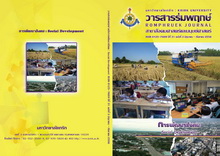จากปัญหาสู่นโยบาย: ศึกษากรณีผู้สูงอายุในจังหวัดชายแดนภาคใต้
Main Article Content
Abstract
From Problems to Policy : A Case Study of the Elderly in Southern Border Provinces
This study has two main objectives : 1) to study the problems and the causes of the problems of the elderly in the southern border provinces, and 2) to propose policy solutions for the elderly in the southern border provinces. The study used qualitative research methods gathering information from document, text, research papers, and focused group discussion. The results revealed that the elderly have four major problems. First is the devaluation and role reduction of the elderly in the family caused by the decrease of respect for elderly members in the family. Second is the neglect and loneliness of the elderly caused by young people leaving their families behind to work in Malaysia and other provinces, the loss of their children in the unrest in the southern provinces, and the expansion of the individualism values . Third is the difficulty of access to services and rights caused by the state agency in charge of the operation not providing sufficient services, lack of publicity about the rights of the elderly thoroughly, and deficiency of proactive work to facilitate the utilization of rights. Four is the problem of having a small number of elderly organizations and management weakness. There should be three policies to solve the problems: promoting the value of respect and role of the elderly, protecting and caring for the elderly, and strengthening the elderly organization.
Article Details
Every article published in the Romphruek Journal of the Humanities and Social Sciences is the opinion and point of view of the authors. Thery're not the viewpoint of Krirk University or the editored department. Any part or all of the articles for pablication must be clearly cited.


